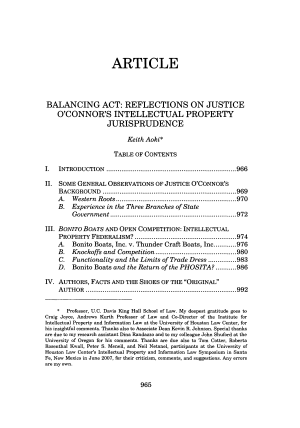Balancing Act: Reflections on Justice O’Connor’s Intellectual Property Jurisprudence
January 2008

DISCLAIMER: This text has been transcribed automatically and may contain substantial inaccuracies due to the limitations of automatic transcription technology. This transcript is intended only to make the content of this document more easily discoverable and searchable. If you would like to quote the exact text of this document in any piece of work or research, please view the original using the link above and gather your quote directly from the source. The Sandra Day O'Connor Institute does not warrant, represent, or guarantee in any way that the text below is accurate.
Article Text
(Excerpt, Automatically generated)
INTRODUCTION
In a case far removed from the intellectual property area, Justice Sandra Day O'Connor once wrote that "
[c]ontext matters."1 Over the course of her twenty-four years on the Court, many commentators have written paeans to Justice O'Connor's "give-it-to-me-straight, cowgirl" approach to judging.2 O'Connor is known and lauded for her preference for broad standards and balancing tests as opposed to bright line rules,3 her penchant for pragmatic approaches,4 and her contributions to the areas of
- Grutter v. Bollinger, 539 U.S. 306, 327 (2003).
Craig Joyce, Lazy Band the Nation's Court: Pragmatism in Service of Principle, 119 HARV. L. REV. 1257, 1272 (2006); see also Scott Bales, Justice Sandra Day O'Connor: No Insurmountable Hurdles, 58 STAN. L. REV. 1705, 1705 (2006) (describing her manner as "unassuming" and "down-to-earth"); Ruth Bader Ginsburg et al., A Tribute to Justice Sandra Day O'Connor, 119 HARV. L. REV. 1239 (2006) (noting O'Connor's straightforward, no-nonsense attitude); Anthony M. Kennedy, William Rehnquist and Sandra Day O'Connor: An Expression of Appreciation, 58 STAN. L. REV. 1663, 1667 (2006) (discussing the dominant influence of O'Connor's western roots).
See Joyce, supra note 2, at 1266 (noting that, in the landmark decision of Roe v. Wade, Justice O'Connor did not like the trimester framework, but rather preferred the undue burden balancing test). For an excellent discussion of the debate over the use of standards versus rules within the Supreme
